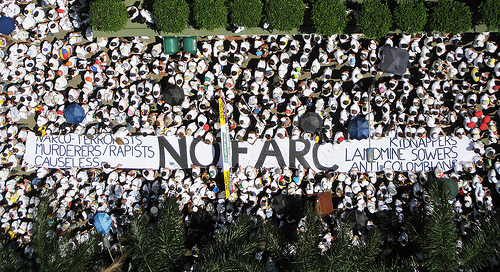
Despite President Juan Manuel Santos’ wish [es] for discretion, news broke [es] in late August that the Colombian government was to begin negotiations with the Revolutionary Armed Forces of Colombia (FARC). This was finally confirmed by Santos on September 4 during a televised speech that outlined that the government’s negotiations [es] with FARC would seek an end to the armed conflict and drug trafficking. Both sides will also discuss victims’ rights, rural development and the participation of FARC in Colombia’s democratic process. Fearing a repeat of the last round of failed negotiationsin 1999-2002, Santos also said that no amnesty would be granted for FARC leaders and that military operations would continue. Minutes later, FARC’s leader, Timoleón Jiménez (‘Timochenko’) appeared in a broadcast from Havana, Cuba and declared that FARC is truly committed to a “civilized dialogue” that would end the decades-old conflict.
Violence will persist
On Distintas Latitudes, Lucas Peña analyzes the differences and similarities with past processes, not only with FARC but also with other armed groups. In conclusion, he asks for more realism, since even a successful process with FARC would not bring an end to violence in Colombia:
The truth is that FARC’s abandonment of arms is one, but not the only condition for peace, because there are other actors associated with organized crime who will still engage in violence, some who may even emerge after the eventual FARC demobilization, as it was shown after the demobilization of the paramilitaries. In Colombia we call these new actors ‘bacrim’, criminal bands servicing drug trafficking, the armies of mafia cartels.
Government in the lead?
On Revista Posición, Alberto Bernal, is very critical of the ongoing process, but praises the choice of government negotiators:
One piece of good news is that the negotiation team appointed by the government is first class. Nothing different could be said about [Luis Carlos] Villegas, [Frank] Pearl, or [retired Army general Jorge Enrique] Mora, three of the people who will be permanently seated at the table. I also find it important to highlight the fact that the decision not to declare a ceasefire is convenient for the government, because it is leading in the war, regardless that FARC lately have increased their attacks against civilians.
On the blog Tras la Cola de la Rata, Juana Galeano says [es] the inclusion of the military in the process is brilliant:
I have to admit it: including members of the Army as negotiators is a masterstroke. Including them, giving them voice, co-opts them and prevents them from sabotaging the process later on.
Most Colombians seem to support the peace process with caution. According to polls, 77% favor negotiations with FARC. However, 72% still oppose the eventual participation of FARC in politics, and 78% do not approve an amnesty without jail terms for guerrilla commanders.
Though former President Álvaro Uribe has become a staunch opponent [es] of almost everything related to President Santos (his former defense minister), some non-governmental organizations have voiced concerns about a legal framework [es] for FARC passed by the Congress last June.
Santos imposed a June 2013 deadline to reach landmark advances, but it seems that this will be a long process, especially since FARC increased their attacks before the announcement.
Learning from past mistakes, improving security all over the country and strengthening trust between the negotiating parties should be important steps towards the success of the talks.
For further information on the topic, please view the following publications from our partners:
Colombia’s Intelligence: Putting the Country at Risk?
FARC Is Weakened, But Far From Dead
For more information on issues and events that shape our world please visit the ISN’s Security Watch and Editorial Plan.

